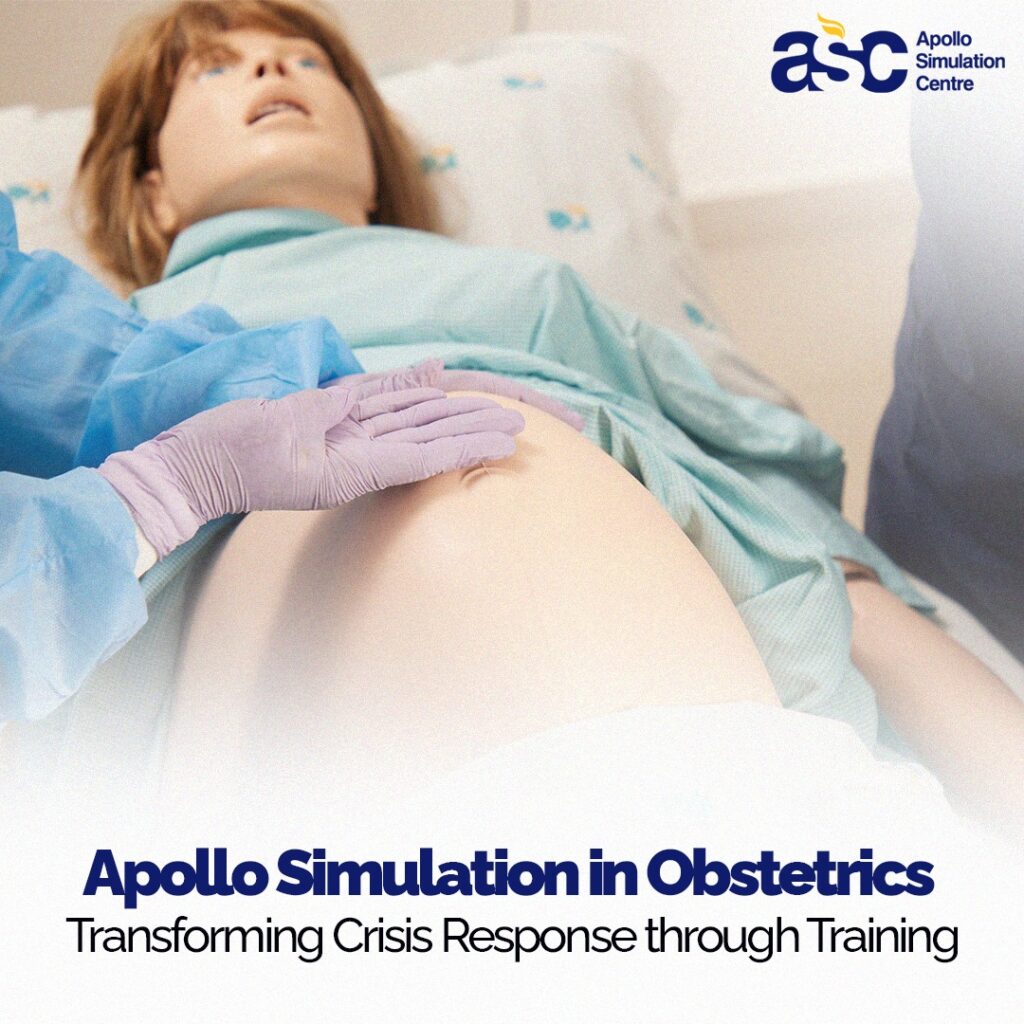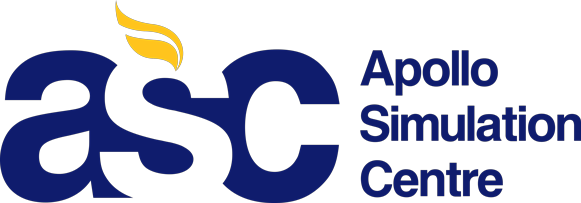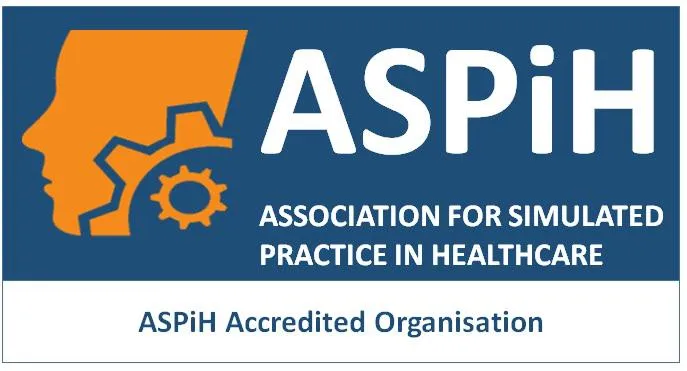Obstetric emergencies are complex, high-risk events that demand prompt and accurate responses to save lives. According to the World Health Organization, in 2020 alone nearly 810 women died daily from preventable causes related to pregnancy and childbirth. Recognising the need for advanced training, the Apollo Simulation Centre has created a transformative approach to obstetric crisis management, equipping healthcare professionals with essential skills through high-fidelity simulations.

The Importance of Crisis Training in Obstetrics
Obstetric emergencies, such as maternal collapse, postpartum haemorrhage (PPH), and eclampsia, are unpredictable but must be managed swiftly. The complexity of these emergencies, coupled with the potential for rapid deterioration, requires healthcare providers to be prepared not only in terms of clinical knowledge but also in the ability to work cohesively within a team. Standard learning methods, such as lectures or textbook knowledge, are insufficient to simulate the intensity and stress of real-life obstetric crises.
This is where high-fidelity simulations prove invaluable. By placing participants in controlled, yet lifelike, crisis scenarios, these simulations provide a safe space for healthcare providers to make critical decisions without the risk of real-life consequences. The ability to practise these skills repeatedly, under varying conditions, ensures that professionals develop both the technical acumen and the confidence required to face such emergencies in clinical settings.
Apollo Simulation Centre’s Crisis Obstetric Team Training (ASCOTT) programme is designed specifically for postgraduate trainees, anaesthetists, nurses, and medical students. This comprehensive training programme blends theoretical knowledge with hands-on practice, ensuring that participants are well-prepared to manage both clinical and non-clinical aspects of obstetric emergencies.
ASCOTT: An Advanced Approach
The ASCOTT programme is tailored to focus on realistic, high-pressure situations encountered in obstetric crises. Using high-fidelity mannequins and real-world scenarios, participants are exposed to situations requiring immediate responses, such as managing PPH, eclampsia, or performing emergency Caesarean sections. This immersive training enables participants to experience the full scope of what a real emergency entails, from the technical aspects of the procedures to the emotional and psychological pressures that often accompany such situations.
One of the defining features of the ASCOTT programme is its commitment to balancing technical skills with non-technical ones. Participants are trained in clinical proficiency, ensuring that they are adept at handling emergencies like a ruptured uterus or a maternal cardiac arrest. However, equal emphasis is placed on the development of teamwork, leadership, and communication skills.
This is particularly important in obstetric emergencies, where multidisciplinary collaboration between obstetricians, anaesthetists, and nursing staff is crucial. Apollo Simulation Centre’s approach directly addresses this gap by fostering an environment where communication and leadership skills are regularly practised and honed.
The Key Skills Developed in ASCOTT
Participants in the ASCOTT programme learn a variety of skills:
- Clinical Proficiency: Participants enhance their abilities to perform life-saving procedures during crises. From managing severe haemorrhage to performing urgent Caesarean sections, the hands-on training provides critical exposure to the real-world demands of obstetric emergencies.
- Teamwork and Communication: Real-life scenarios allow participants to practise effective communication, critical for avoiding delays and errors. The ability to communicate swiftly and clearly under pressure is crucial in ensuring positive patient outcomes during crises.
- Emotional Resilience: Participants learn to stay calm and composed under pressure, managing the emotional demands of crisis situations. This emotional resilience is as important as clinical skill in ensuring healthcare professionals can continue to function effectively under high levels of stress.
The programme also incorporates feedback mechanisms that allow participants to evaluate their performance and improve team dynamics. A study published in the American Journal of Obstetrics and Gynecology shows that simulation training improves team performance, underscoring the effectiveness of Apollo Simulation’s approach.
Simulation Technology and Its Impact
The foundation of the ASCOTT programme lies in its advanced simulation technology. High-fidelity mannequins, capable of replicating various obstetric complications, offer participants a unique opportunity to experience lifelike emergencies. These mannequins can display critical signs like haemorrhage and uterine rupture, providing a realistic platform for participants to practise handling emergency situations.
In addition to high-fidelity mannequins, the programme utilises advanced audio-visual systems that allow participants to review their performance post-simulation. This debriefing session is essential for continuous improvement, as participants can reflect on their decision-making processes, team dynamics, and technical execution. By reviewing footage of the simulation, participants gain critical insights into their strengths and areas for improvement, making the learning process iterative and continually evolving.
Moreover, the programme includes online modules that prepare participants for hands-on simulations. These theoretical lessons cover a wide array of obstetric emergencies, ensuring that trainees are well-equipped with knowledge before entering the simulation environment. This combination of online learning with practical application ensures a comprehensive understanding of obstetric crises.
Improving Crisis Management through Training
The aim of Apollo Simulation Centre’s training is clear: improving crisis management in obstetrics. Through high-quality simulations, participants develop the confidence and skill set required to respond to emergencies swiftly and effectively. Massive reduction in maternal death risk has been attributed to simulation-based training, as highlighted by a study in The Lancet Global Health.
Participants who complete the programme report enhanced preparedness for real-life emergencies. They feel better equipped to handle situations like postpartum haemorrhage, one of the leading causes of maternal mortality. By enabling participants to practise complex procedures in a simulated environment, Apollo Simulation ensures that healthcare providers can respond rapidly and effectively when faced with real-world crises.
Application in Clinical Settings
Beyond individual skill enhancement, the ASCOTT programme improves the collective performance of medical teams. The team-oriented structure of the simulations mimics real-world settings, where collaboration between obstetricians, anaesthetists, and nurses is crucial. By improving team cohesion and communication, the programme has a direct impact on patient outcomes. This approach leads to better resource utilisation, reduced errors, and faster response times, all of which contribute to lowering the maternal mortality rate.
Apollo Simulation Centre’s dedication to advancing obstetric crisis training is evident in the outcomes experienced by participants, with marked improvements in both technical and soft skills. Participants frequently report an increased ability to anticipate complications before they arise, improved coordination within their teams, and greater clarity in role delegation during high-pressure situations.
Challenges and Future Prospects
While the ASCOTT programme offers comprehensive training for obstetric emergencies, it also addresses the challenges inherent in obstetric crisis management. One of the most significant challenges is the emotional toll these emergencies can take on healthcare professionals. Apollo Simulation Centre integrates resilience training into its programme, equipping participants with the emotional tools needed to manage stress and stay focused during emergencies.
This holistic approach ensures that healthcare providers are not only technically proficient but also emotionally prepared to deal with the complexities of obstetric emergencies. As technology continues to advance, Apollo Simulation Centre is poised to remain at the forefront of medical training by integrating the latest developments in simulation technology into its programmes. With an ever-growing demand for highly trained medical professionals, especially in crisis-prone areas like obstetrics, Apollo’s continued innovation will play a crucial role in shaping the future of healthcare.
Changing The Landscape Of Obstetrics
The Apollo Simulation Crisis Obstetric Team Training programme represents a significant leap forward in crisis management training for healthcare professionals. By integrating state-of-the-art simulation technology with a focus on both clinical and non-clinical skills, Apollo Simulation Centre is ensuring that its participants are well-prepared for the challenges of managing obstetric emergencies.
As maternal mortality remains a critical issue globally, the ASCOTT programme offers a solution that equips healthcare providers with the skills, confidence, and resilience necessary to save lives. Apollo Simulation Centre continues to be a significant influence in medical training, transforming how obstetric emergencies are managed through its innovative and comprehensive approach.




